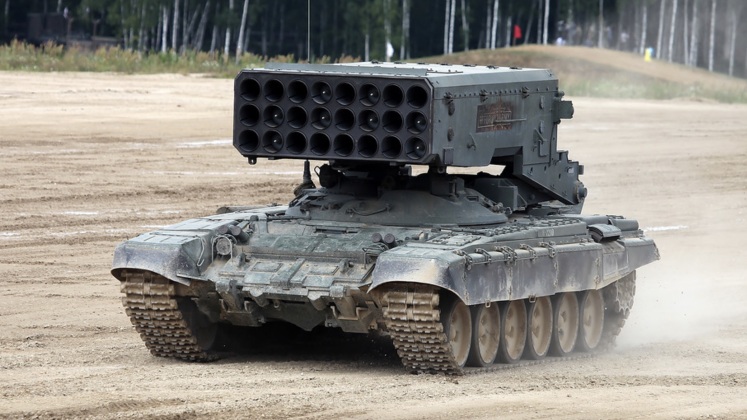News
‘TOS-3’ Prototype Ready: Russia Developing Successor to Feared TOS-1A Thermobaric Artillery System After Battlefield Successes
Russian defence conglomerate Rostec is developing a successor to the TOS-1A 220 millimetre thermobaric rocket artillery system, following the significant attention the asset’s combat performance in the Ukrainian theatre has gained. Rostec Industrial Director of Weapon Systems Bekhan Ozdoev stated on April 8 confirmed that the first prototype of the system had already been built, with the Omsktransmash factory having already filed an application to register the trademark TOS-3 ‘Dragon’ – the designation of the new system. Ozdoev revealed regarding the system’s ongoing development: “For example, everyone knows the TOS-1 Solntsepyok and TOS-2 Tosochka heavy flamethrower systems. These are powerful weapons that have performed well in the special military operation zone. We are now working on the creation of a new TOS-3 heavy flamethrower system. A promising vehicle on a tracked base will be equipped with a new launcher. This will increase the firing range and use new ammunition.”

The TOS-1A’s capabilities have notably been improved significant over time, with CEO of the Signal Research Institute Vladimir Pimenov having revealed shortly before Director Ozdoev’s statement that a new navigation system had “improved operating accuracy to a few meters.” “CBR [Nuclear, Biological and Chemical Protection] troops asked whether we have research solutions for greater flexibility of Solntsepyok operation at firing positions. We offered our positioning system, which makes it possible to reduce combat time at a firing position without the combat vehicle leaving by a crew and a commander,” he elaborated. The TOS-1A’s thermobaric ammunition works by dispersing a gaseous cloud of chemicals into the air which are then detonated by a vacuum explosive, releasing a high pressure shock wave that sucks air out of confined areas with tremendous force. This is optimal for neutralising enemy ground forces in fortified positions, and can destroy buildings, caves, trenches and other fortifications while rupturing the lungs of all present in the vicinity. The system has gained more attention in the Ukrainian theatre the arguably any other asset in the Russian ground forces, and has been supplemented by growing use of high payload thermobaric glide bombs such as the ODAB-500 dropped by Russian fighters to clear Ukrainian and allied forces out of fortified positions.












